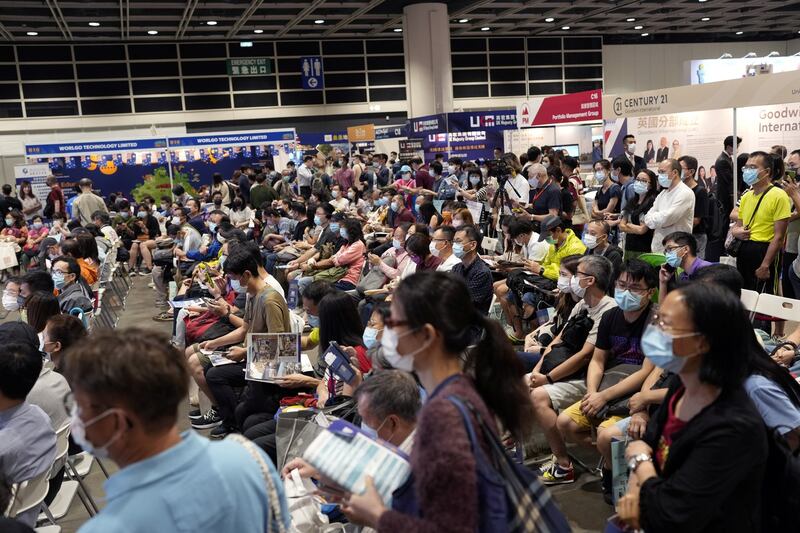China has unveiled a new visa scheme that could draw a large influx of highly qualified people to live and work in Hong Kong, which has seen a mass exodus of people since the ruling Chinese Communist Party launched a crackdown on dissent in the wake of 2019 protests.
China's Exit-Entry Administration will launch a pilot scheme from Feb. 20 that will allow senior scientists, healthcare professionals and investment arbitrators to enter and leave Hong Kong and Macau more freely, in a move commentators said could hamper social mobility for Hong Kongers who remain in the city.
The move comes after media backed by the ruling party called for schemes to balance out the exodus of highly-trained professionals, who have been leaving Hong Kong in droves in recent years, prompting concerns of a brain drain affecting major companies, education and healthcare.
Successful applicants to the scheme will be given a multiple entry visa for Hong Kong and Macau, the Exit-Entry Administration of China said in a Feb. 9 statement on its official website.
According to the notice, the scheme is being administered entirely by Chinese immigration officials, despite promises that Hong Kong would police its own borders following the 1997 handover to China.
The new visas were announced unilaterally by Beijing, with Hong Kong having no say in the matter, current affairs commentator Sang Pu said.
"The people of Hong Kong have no right to say ‘no’ or to approve any of this," Sang said. "The Hong Kong government isn't representative of public opinion, and [Beijing] wouldn't trust it to do anything [any more] anyway."
"If the Chinese government issues a directive, Hong Kong will accept it," he said. "There used to be room for discussion before, back in the era of [former chief executives] Donald Tsang and Leung Chun-ying."
No longer the same
Hong Kong is no longer the place it used to be, Sang said, adding that China has been moving to erase the internal border between Hong Kong and neighboring Chinese cities of what Beijing terms the "Greater Bay Area" in the Pearl River Delta region.
"They want to tear down the walls [that once existed] under one country, two systems," he said, in a reference to promises from Beijing that the city would retain its traditional freedoms and govern its own affairs with the exception of foreign affairs and defense, and maintain its own immigration border following the handover.
"The loosening of requirements will intensify Hong Kong's integration into the Greater Bay Area and prepare it for full integration into communist China," Sang said.

Officials at Hong Kong's immigration department confirmed on Monday night that all queries relating to the visa scheme should be addressed to the mainland Chinese authorities.
A person familiar with the matter said frontline immigration staff in Hong Kong only found out about the scheme via media reports.
‘Boost mutual cooperation’
China already runs a "two-way permit" scheme governing which of its nationals are allowed to visit Hong Kong for tourism, family visits, business meetings, training, employment and study.
The directive announcing the new scheme gave scant details of any quotas or what exactly constitutes "talent" from the point of view of the authorities.
Hong Kong leader John Lee said on Monday that he plans to visit local leaders in neighboring Guangdong province "in the near term," and make a tour of Greater Bay Area cities "to boost mutual cooperation to a higher level."
According to Hong Kong media reports, the new visa scheme will likely spark a large influx of middle-class and relatively wealthy people, as well as highly qualified professionals, from mainland China to Hong Kong.
Former Cable News finance channel director Yim Po-kung told local media that the scheme seeks to replace the middle-class professionals who are emigrating with their families to avoid living under the draconian national security law, imposed by Beijing on Hong Kong from July 1, 2020.
"These so-called new Hong Kongers will mostly be taking over executive- and management-level jobs," Yim said. "Local Hong Kongers won't be paid such high salaries."
He said if Hong Kongers elected to stay, they could find a glass ceiling obstructing future promotions or raises.
"Will they be able to rise to the next level, and will the competition be fair in future?" he said. "Hong Kong used to be more about ability than background, but ... it could be that young people's chances of promotion will be affected under a new governing class."
Marginalized
Commentator Simon Lee agreed, saying Hong Kongers who had always lived in the city could be marginalized as mainland Chinese people replace those who leave.
"There may not appear to be much difference on the face of it, but eventually they will start to feel that [the incoming professionals] won't regard them as one of their own," Lee said.
"In any face-off between highly qualified Hong Kongers and people coming in from the north, the Hong Kongers will basically lose," he said.
Hong Kong officials have been traveling the region in recent months in a bid to attract fresh talent, particularly younger people, to settle in the city as a crackdown on dissent continues to drive middle-class families to flee the former British colony.
Secretary for Labour and Welfare Chris Sun made a trip to Singapore and the Philippines earlier this month to peddle the "advantages" offered by Hong Kong's proximity to mainland China and its growing integration with other cities in the Pearl River Delta under the "Greater Bay Area" plan.
Chief Executive John Lee announced a slew of measures last October including a scheme aimed at enticing graduates from the world's top 100 universities, including two in Singapore, to come and work in the city.
Translated by Luisetta Mudie. Edited by Matt Reed.
